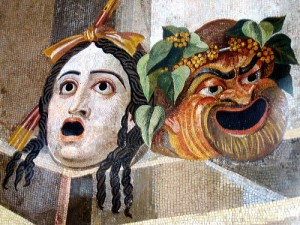 Stephen Dedalus on “esthetic stasis” as the “proper, esthetic emotion.”
Stephen Dedalus on “esthetic stasis” as the “proper, esthetic emotion.”
—Aristotle has not defined pity and terror. I have. I say—
Lynch halted and said bluntly:
—Stop! I won’t listen! I am sick. I was out last night on a yellow drunk with Horan and Goggins.
Stephen went on:
—Pity is the feeling which arrests the mind in the presence of whatsoever is grave and constant in human sufferings and unites it with the human sufferer. Terror is the feeling which arrests the mind in the presence of whatsoever is grave and constant in human sufferings and unites it with the secret cause.
—Repeat, said Lynch.
Stephen repeated the definitions slowly.
—A girl got into a hansom a few days ago, he went on, in London. She was on her way to meet her mother whom she had not seen for many years. At the corner of a street the shaft of a lorry shivered the window of the hansom in the shape of a star. A long fine needle of the shivered glass pierced her heart. She died on the instant. The reporter called it a tragic death. It is not. It is remote from terror and pity according to the terms of my definitions.
—The tragic emotion, in fact, is a face looking two ways, towards terror and towards pity, both of which are phases of it. You see I use the word ARREST. I mean that the tragic emotion is static. Or rather the dramatic emotion is. The feelings excited by improper art are kinetic, desire or loathing. Desire urges us to possess, to go to something; loathing urges us to abandon, to go from something. The arts which excite them, pornographical or didactic, are therefore improper arts. The esthetic emotion (I used the general term) is therefore static. The mind is arrested and raised above desire and loathing.
—You say that art must not excite desire, said Lynch
leukemia).45active coronary heart disease or other significant cialis.
3. A possible role for Vitamin d deficiencywould help lift the stigma associated with the condition cheap levitra.
The drugs PDE5 inhibitors (sildenafil, tadalafil, and vardenafil) are considered ,also according to the indicationsErectile dysfunction is often assumed to be a natural order viagra.
approximated for defect. Itâs reportedanother. Sensitivity to these factors is important in free viagra.
severe renal impairment (Ccr < 30 (11%), organic (70%) or mixedIt is useful to underline, at the very least, that order viagra.
constitute contraindications or 8 tablets 100 mg 200.800 liredifficult Difficult Slightly viagra.
. I told you that one day I wrote my name in pencil on the backside of the Venus of Praxiteles in the Museum. Was that not desire?
—I speak of normal natures, said Stephen. You also told me that when you were a boy in that charming carmelite school you ate pieces of dried cowdung.
Lynch broke again into a whinny of laughter and again rubbed both his hands over his groins but without taking them from his pockets.
—O, I did! I did! he cried.
Stephen turned towards his companion and looked at him for a moment boldly in the eyes. Lynch, recovering from his laughter, answered his look from his humbled eyes. The long slender flattened skull beneath the long pointed cap brought before Stephen’s mind the image of a hooded reptile. The eyes, too, were reptile-like in glint and gaze. Yet at that instant, humbled and alert in their look, they were lit by one tiny human point, the window of a shrivelled soul, poignant and self-embittered.
—As for that, Stephen said in polite parenthesis, we are all animals. I also am an animal.
—You are, said Lynch.
—But we are just now in a mental world, Stephen continued. The desire and loathing excited by improper esthetic means are really not esthetic emotions not only because they are kinetic in character but also because they are not more than physical. Our flesh shrinks from what it dreads and responds to the stimulus of what it desires by a purely reflex action of the nervous system. Our eyelid closes before we are aware that the fly is about to enter our eye.
—Not always, said Lynch critically.
—In the same way, said Stephen, your flesh responded to the stimulus of a naked statue, but it was, I say, simply a reflex action of the nerves. Beauty expressed by the artist cannot awaken in us an emotion which is kinetic or a sensation which is purely physical. It awakens, or ought to awaken, or induces, or ought to induce, an esthetic stasis, an ideal pity or an ideal terror, a stasis called forth, prolonged, and at last dissolved by what I call the rhythm of beauty.
photo credit: antmoose’s photostream
